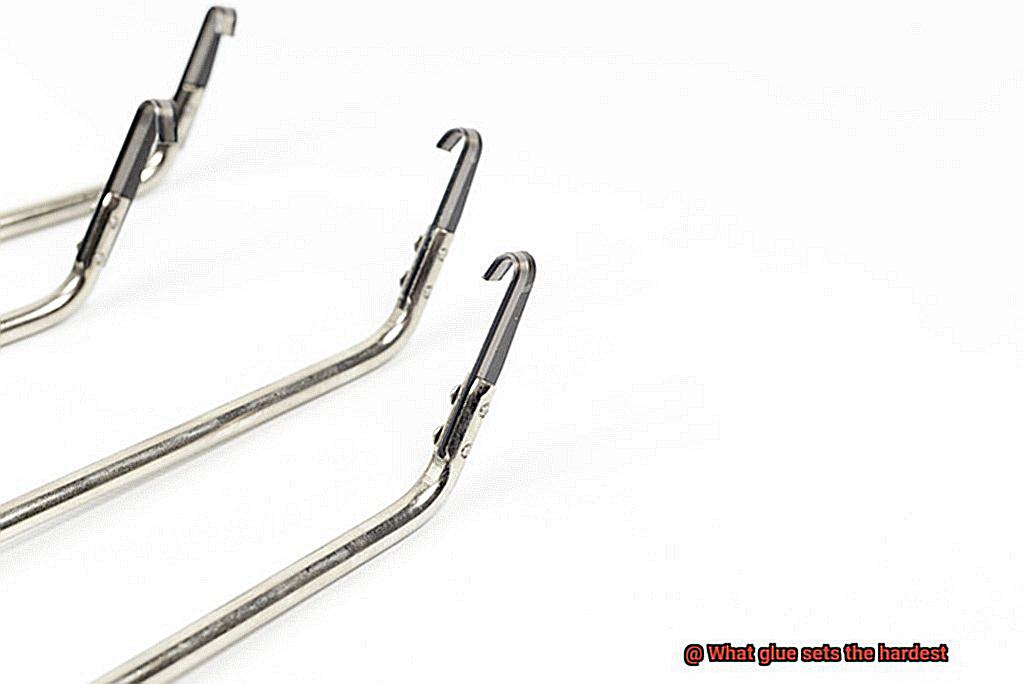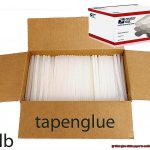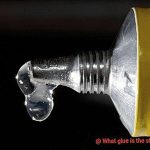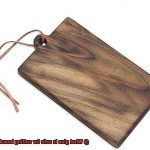Are you tired of your projects falling apart because the glue just isn’t strong enough?
I feel your pain. Picture this: you’ve poured your heart and soul into creating something amazing, only to watch it crumble before your eyes.
It’s enough to make you want to scream. But fear not, my friend.
In this blog post, we’re going to dive headfirst into the world of adhesives and find out once and for all what glue sets the hardest. We’ll explore all the different types of glues out there and put them to the ultimate test.
Let’s get started now.
What is Glue?
Contents
Glue, a seemingly unassuming substance, possesses the extraordinary power to bond materials together, making it an indispensable tool across various industries and in our daily lives. Prepare to embark on a fascinating journey into the world of glue, where we will unravel its composition, delve into its diverse types, and explore their distinctive characteristics and practical applications.
Understanding Glue:
At its core, glue is a versatile adhesive substance employed to unite two or more surfaces. Its composition comprises polymers, solvents, and additives. These elements work in harmony: polymers form chemical bonds with the materials being joined, solvents facilitate easy application and even spreading, and additives enhance specific properties like drying time or flexibility.
Types of Glue:
- PVA Glue: A cost-effective and multipurpose adhesive, PVA glue boasts a water-based formula that dries transparent. Its versatility shines through in woodworking projects, paper crafts, and common household repairs.
- Epoxy Glue: Renowned for its unparalleled strength and durability, epoxy glue consists of resin and hardener components that must be skillfully mixed before use. This adhesive is impervious to water, heat, chemicals, and impacts, rendering it ideal for bonding metals, ceramics, glass, and select plastics.
- Super Glue: Also referred to as cyanoacrylate adhesive, super glue forms an instantaneous bond when exposed to ambient moisture. Its lightning-fast adhesion capabilities encompass a wide array of materials, making it a go-to option for swift repairs or projects necessitating rapid bonding.
- Hot Glue: Employing the molten state of hot glue through a specialized gun creates quick solidification upon cooling. This versatile adhesive excels in crafts, floral arrangements, and bonding porous materials such as fabric or foam.
- Construction Adhesive: Engineered for heavy-duty applications in the construction industry, construction adhesives offer robust bonding abilities on surfaces such as wood, concrete, metal, and drywall. Resistant to moisture, heat, and vibrations, they ensure steadfast connections.
Which Glue Sets the Hardest?
Epoxy glue, cyanoacrylate glue (super glue), and polyurethane glue reign supreme when it comes to achieving rock-solid hardness upon complete curing. Epoxy glue stands out with its exceptional strength and resilience, while super glue rapidly forms rigid and durable bonds.
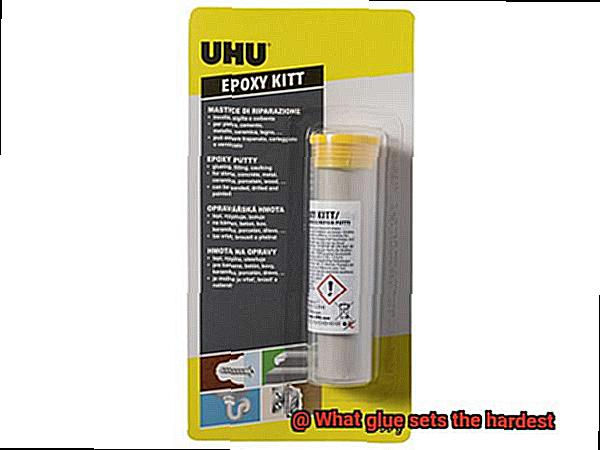
Polyurethane glue expands as it dries, effectively filling gaps and creating formidable connections. Each of these glues possesses unique characteristics that cater to specific applications.
Types of Glues
In this article, we will take a deep dive into the characteristics and strengths of various glues available in the market. From the superhero-like epoxy glue to the versatile hot glue, each type possesses unique properties that make them suitable for different applications. Let’s embark on this exciting journey through the realm of glues.
Epoxy Glue: Unleashing Super Strength
Epoxy glue is a true superhero in the glue world, boasting unparalleled strength. Composed of two parts – resin and hardener – when mixed together, epoxy glue creates an incredibly robust bond. Its hardened state is as tough as nails, making it ideal for heavy-duty projects that require exceptional durability.
With resistance to high temperatures and moisture, epoxy glue proves its mettle in various applications.
Super Glue: The Speedy Fixer
When it comes to quick fixes, super glue is the go-to adhesive. Also known as cyanoacrylate glue, it sets in a blink of an eye upon contact with moisture. This adhesive forms an ultra-strong bond that sets rock-hard within seconds. Its magic lies in its ability to work wonders on a wide range of materials such as plastics, metals, ceramics, and more.
Wood Glue: The Star Performer for Wood Surfaces
For bonding wood surfaces, wood glue takes center stage. Whether it’s PVA glue or polyurethane glue, both variants offer excellent bonding strength. Although they may not set as hard as epoxy or super glue, their formulations are specifically tailored for wood projects. Wood glues excel in filling gaps and creating sturdy bonds that can withstand the test of time.
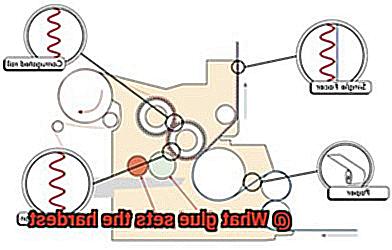
Construction Adhesive: The Hero of Heavy-Duty Projects
When heavy-duty construction projects call for a hero, construction adhesive comes to the rescue. This adhesive sets very hard and forms a strong bond between materials like wood, concrete, and metal. With resistance to weathering and extreme temperatures, construction adhesive ensures that your projects stand strong against the elements.
Silicone Adhesive: The Flexible Bonding Solution
While not traditionally considered a glue, silicone adhesive deserves a mention for its bonding capabilities. It forms a strong bond and sets to a relatively hard consistency. What sets silicone adhesive apart is its flexibility, making it perfect for applications that require movement or expansion. Whether you’re sealing joints or bonding glass, silicone adhesive delivers reliable results.
Epoxy Glue: Pros and Cons
On the advantages side, epoxy glue is known for its exceptional bonding strength. It forms a bond stronger than most other glues, making it suitable for a wide range of applications. Wood, metal, plastic, glass, ceramics – epoxy glue can handle them all.
Another advantage is its resistance to water and heat. After curing, epoxy glue can withstand exposure to moisture, making it perfect for use in humid or wet environments. Additionally, it can handle high temperatures without losing its adhesive properties. So if you’re working in areas prone to heat or open flames, epoxy glue has got your back.
One of the most impressive advantages of epoxy glue is its ability to fill gaps. Its thick consistency allows it to easily fill small gaps and cracks, ensuring a strong bond. This feature is particularly useful when working with uneven or irregularly-shaped materials.
However, epoxy glue does have its drawbacks. Firstly, it can be messy to work with due to its two-part formulation. Precision in mixing the resin and hardener is required to avoid spills or waste. Additionally, once mixed, epoxy glue has a limited working time before it starts to harden. So efficiency is key when applying the adhesive.
Another downside is its potential toxicity. Epoxy adhesives often contain chemicals that can be harmful if ingested or inhaled. Ventilation and safety precautions like gloves and masks are essential to minimize health risks.
Lastly, epoxy glue can be more expensive compared to other adhesives. Its high strength and durability come at a cost, making it pricier than alternatives like super glue or wood glue. Nevertheless, many users find the investment worthwhile due to its superior bonding capabilities and long-lasting results.
Cyanoacrylate Glue: Pros and Cons
Like any product, it has its pros and cons.
Let’s start with the pros. First and foremost, cyanoacrylate glue boasts exceptional bonding strength. It forms a strong and durable bond between different materials such as plastic, metal, rubber, wood, and ceramics. This versatility makes it suitable for various projects, from repairing household items to industrial uses.
Another advantage is its rapid setting time. Unlike other adhesives that take hours to dry, cyanoacrylate glue typically dries in seconds or minutes. This fast-curing property makes it ideal for situations where immediate bonding is required.
Additionally, cyanoacrylate glue is incredibly versatile. It can be used on various substrates, making it a practical choice for different projects. Whether you’re working with different materials or need to bond multiple surfaces together, this adhesive can get the job done.
Furthermore, cyanoacrylate glue exhibits excellent resistance to moisture and temperature fluctuations. It can withstand both high and low temperatures without losing its bonding capabilities or becoming brittle. It also resists water and other liquids, making it suitable for applications that may involve exposure to moisture.
Now let’s explore the cons. One of the main drawbacks of cyanoacrylate glue is its lack of flexibility once cured. The bond formed by this adhesive tends to be rigid and brittle, which can be a disadvantage when bonding materials that require some degree of flexibility.
Additionally, cyanoacrylate glue is not well-suited for bonding surfaces with large gaps or irregularities. It works best when the surfaces being bonded fit together tightly. The thin viscosity of the glue prevents it from effectively filling in gaps, reducing its effectiveness in certain situations.
Moreover, cyanoacrylate glue is highly sensitive to moisture during the bonding process. Even a small amount of moisture can interfere with its ability to form a strong bond. Therefore, it is crucial to ensure that the surfaces to be bonded are clean and free of moisture before applying the glue.
Lastly, cyanoacrylate glue can cause skin and eye irritation if not handled properly. It is essential to take necessary precautions, such as wearing protective gloves and goggles, and avoid direct contact with the adhesive. In case of accidental contact, it is advisable to wash the affected area with plenty of water and seek medical attention if necessary.
Polyurethane Glue: Pros and Cons
Polyurethane glue, a powerful adhesive revolutionizing the DIY and professional world, is here to tackle all your bonding needs. In this article, we will explore the pros and cons of using polyurethane glue, equipping you with the knowledge to make an informed decision for your next project. Get ready to dive into the world of bonding excellence.
Exceptional Strength:
Polyurethane glue is a force to be reckoned with, boasting impressive bonding capabilities that can withstand the toughest conditions. It forms a bond resistant to water, heat, and chemicals, ensuring your projects stay intact even in extreme environments. Say goodbye to weak connections and hello to unparalleled strength.
Versatility at Its Finest:
No matter the material you’re working with – wood, metal, plastic, or even glass – polyurethane glue has got you covered. Its versatility shines through as it effortlessly bonds a wide range of materials with a strong and durable connection. No more searching for different adhesives for each material – polyurethane glue is your one-stop solution.
Gap-Filling Marvel:
Bid farewell to frustrating gaps and irregularities in your projects. Polyurethane glue’s gap-filling properties allow it to fill in those imperfections, creating a tight and solid connection. This feature is especially handy for projects that require precise alignment or have uneven surfaces. Let your creations be flawless from every angle.
Extended Open Time:
With polyurethane glue, time is on your side. Its long open time allows you to position and adjust your pieces before the adhesive sets. No more rushed moments or misaligned projects – take your time and get it just right. Your masterpiece deserves perfection.
Slow Curing Time:
However, be prepared for patience when using polyurethane glue. Its slow curing time means you’ll have to wait before seeing the final results. If you’re looking for a quick fix, this might not be the ideal adhesive for you. But remember, good things come to those who wait.
Expanding Glue Woes:
As polyurethane glue cures, it tends to expand. While this allows for excellent bonding, it can also lead to excess glue squeezing out of the joint. Embrace the art of cleanup to ensure a tidy finish. A little extra effort for a flawless outcome.
Consider the Cost:
Polyurethane glue’s advanced properties and exceptional strength come at a price. Compared to other adhesives on the market, it can be more expensive. Before diving in, consider whether the investment is worthwhile for your specific project. Quality often comes with a price tag.
Wood Glues: Pros and Cons
Wood glues are a vital component of any woodworking project, ensuring that pieces of wood are securely joined together. However, with various types of wood glues available, it’s important to understand their pros and cons to make the right choice for your specific needs.
- Polyvinyl acetate (PVA) glue: PVA glue, also known as yellow glue or carpenter’s glue, is a popular choice due to its availability and affordability. It forms a strong bond that can withstand regular wear and tear, making it suitable for most woodworking projects. Its moderate drying time allows for adjustments before setting, and cleanup is easy with water. However, it may not be as strong as other types of glue and is not ideal for heavy-duty applications.
- Epoxy resin: Epoxy glue is renowned for its exceptional strength and durability. It creates an incredibly strong bond that can withstand heavy loads and extreme conditions. However, epoxy takes longer to dry compared to PVA glue and requires mixing before use. It also tends to be more expensive.
- Polyurethane glue: Polyurethane glue offers both strength and flexibility, making it suitable for uneven or irregular surfaces. It expands as it cures, filling gaps and creating a strong bond. It also provides good resistance to moisture, making it suitable for indoor and outdoor applications. However, it has a longer drying time and requires clamping during curing.
- Cyanoacrylate glue: Commonly known as super glue, cyanoacrylate glue bonds quickly and forms a rigid bond. It is excellent for small repairs or bonding delicate pieces of wood. However, it can become brittle over time and is not suitable for larger woodworking projects that require more flexibility.
Specialized Adhesives
Specialized adhesives are the superheroes of the adhesive universe, designed to tackle specific tasks and materials with their exceptional bond strength and durability. These glues are formulated for specific applications, making them ideal for demanding projects where regular glues may fall short.
One type of specialized adhesive is epoxy. This stuff is known for its incredible strength and resistance to heat, chemicals, and moisture. It’s a two-component glue that requires mixing before use. Once it’s cured, epoxy forms a rock-solid bond on materials like metal, glass, ceramics, and plastics. Need to fix a broken mug or create a sturdy metal sculpture? Epoxy has got you covered.
Next on our list is cyanoacrylate glue, also known as super glue. This adhesive is lightning-fast and forms an instant bond when it comes into contact with moisture. Perfect for quick repairs or bonding small parts together, super glue is a go-to solution for materials like metal, rubber, and plastic.
For projects that require flexibility and resilience, polyurethane adhesives are the way to go. These adhesives excel at bonding surfaces like wood, metal, and plastic. They can withstand extreme temperatures and offer good resistance to water, making them suitable for both indoor and outdoor projects.
And let’s not forget about contact cement. This specialized adhesive is specifically formulated for bonding large surface areas. It’s commonly used for laminating countertops or installing flooring because it provides a strong and durable bond. Just be sure to apply it carefully since it dries quickly.
Considerations for Selecting the Best Glue for Your Project
With a plethora of options available, it can be overwhelming to find the perfect adhesive. But fear not. In this article, we’ll guide you through the key considerations to help you choose the best glue for your project, ensuring a strong and durable bond that stands the test of time.
Know Your Materials:
Identify the materials you’re working with before making a selection. Wood, metal, plastic, fabric, or glass – each requires a specific glue to form a solid bond. Compatibility is key for a lasting result.
Strength and Durability:
Consider your project’s requirements. Do you need a permanent or temporary bond? For woodworking projects that demand exceptional strength, epoxy or polyurethane glue is ideal. Glue sticks or double-sided tape work well for temporary adhesion or sewing purposes.
Drying Time:
The drying time of the glue is vital. Quick-drying glues save time, while others may take hours or days to cure fully. Follow the manufacturer’s instructions to ensure optimal bonding results.
Intended Use and Conditions:
Think about how your project will be used and the conditions it will face. Choose a glue with water resistance or weatherproof properties if it will be exposed to moisture, extreme temperatures, or outdoor elements. Marine epoxy is perfect for boat repairs or outdoor furniture construction.
Safety First:
Prioritize safety when selecting glue. Some emit strong fumes or contain toxic chemicals that can harm skin or cause health issues if ingested. Read and follow all safety warnings and instructions provided by the manufacturer. Opt for non-toxic or low-odor glues for indoor use or around children.
Ease of Use:
Consider the glue’s application method. Squeeze bottles or tubes offer convenience, while others may require mixing components. Special tools or techniques may be necessary for proper application. Choose a glue that suits your comfort level and skill set to ensure successful bonding without unnecessary hassle.
PBE2AutH8Kw” >
Conclusion
The question of what glue sets the hardest is one that has intrigued many. When it comes to adhesive strength, there are numerous options available on the market. However, if you’re looking for a glue that truly sets hard and strong, there are a few contenders that stand out.
One such contender is epoxy glue. Known for its exceptional bonding properties, epoxy glue forms an incredibly strong bond that can withstand heavy loads and extreme temperatures. It dries to a rock-solid finish, making it ideal for projects that require maximum durability.
Another option is polyurethane glue. This type of adhesive expands as it cures, filling in gaps and creating an incredibly strong bond. It sets hard and rigid, providing excellent resistance to moisture and chemicals.
For those seeking a more versatile option, cyanoacrylate glue, commonly known as super glue, is worth considering. Super glue bonds quickly and securely to various materials, including metal, plastic, and wood. It sets hard in mere seconds and forms an extremely durable bond.
Lastly, we have two-part acrylic adhesives like methacrylate or MMA glues. These glues consist of two components that must be mixed together before use. Once mixed, they create a powerful adhesive with excellent impact resistance and high strength.
In conclusion, when it comes to finding the glue that sets the hardest, epoxy glue, polyurethane glue, cyanoacrylate glue (super glue), and two-part acrylic adhesives are all top contenders. Each offers unique characteristics and strengths depending on your project requirements.

